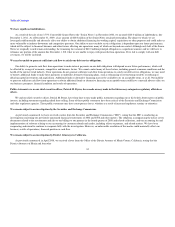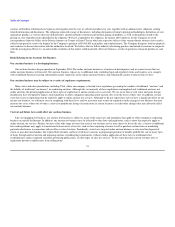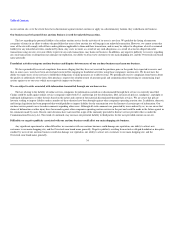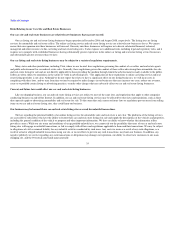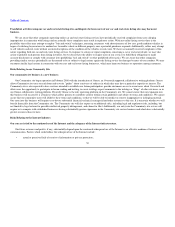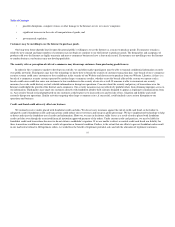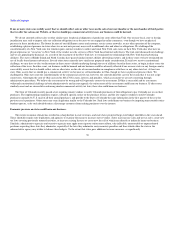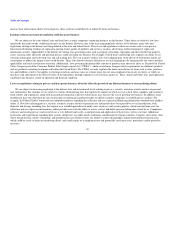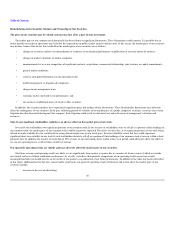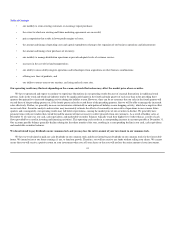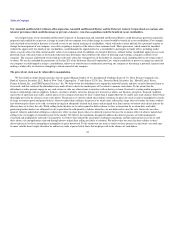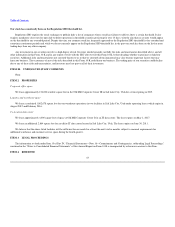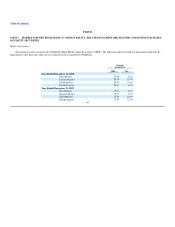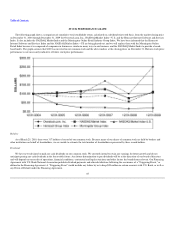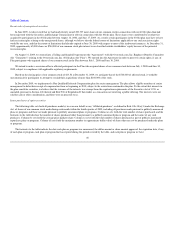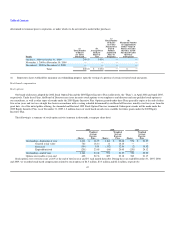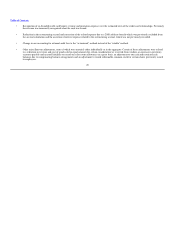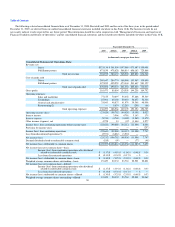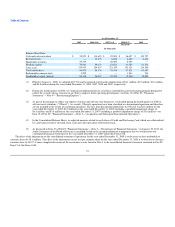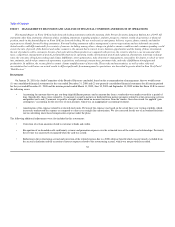Overstock.com 2009 Annual Report Download - page 45
Download and view the complete annual report
Please find page 45 of the 2009 Overstock.com annual report below. You can navigate through the pages in the report by either clicking on the pages listed below, or by using the keyword search tool below to find specific information within the annual report.
Table of Contents
Our Amended and Restated Certificate of Incorporation, Amended and Restated Bylaws and the Delaware General Corporation Law contains anti-
takeover provisions which could discourage or prevent a takeover, even if an acquisition would be beneficial to our stockholders.
Several provisions of our Amended and Restated Certificate of Incorporation and Amended and Restated Bylaws could discourage potential acquisition
proposals and could delay or prevent a change in control of our company even if that change in control would be beneficial to our stockholders. For example,
only one-third of our board of directors is elected at each of our annual meetings of stockholders, which will make it more difficult for a potential acquirer to
change the management of our company, even after acquiring a majority of the shares of our common stock. These provisions, which cannot be amended
without the approval of two-thirds of our stockholders, could diminish the opportunities for a stockholder to participate in tender offers, including tender
offers at a price above the then current market value of our common stock. In addition, our board of directors, without further stockholder approval, may issue
preferred stock, with such terms as the board of directors may determine, that could have the effect of delaying or preventing a change in control of our
company. The issuance of preferred stock could also adversely affect the voting powers of the holders of common stock, including the loss of voting control
to others. We are also afforded the protections of Section 203 of the Delaware General Corporation Law, which could delay or prevent a change in control of
our company or could impede a merger, consolidation, takeover or other business combination involving our company or discourage a potential acquirer from
making a tender offer or otherwise attempting to obtain control of our company.
The price of our stock may be vulnerable to manipulation.
We have filed an unfair business practice lawsuit against Morgan Stanley & Co. Incorporated, Goldman Sachs & Co., Bear Stearns Companies, Inc.,
Bank of America Securities LLC, Bank of New York, Citigroup Inc., Credit Suisse (USA) Inc., Deutsche Bank Securities, Inc., Merrill Lynch, Pierce,
Fenner & Smith, Inc., and UBS Financial Services, Inc. We believe that the defendants have engaged in unlawful actions and have caused substantial harm to
Overstock, and that certain of the defendants have made efforts to drive the market price of Overstock's common stock down. To the extent that the
defendants or other persons engage in any such actions or take any other actions to interfere with or destroy or harm Overstock's existing and/or prospective
business relationships with its suppliers, bankers, customers, lenders, investors, prospective investors or others, our business, prospects, financial condition
and results of operation may suffer, and the price of our common stock may be more volatile than it might otherwise be and/or may trade at prices below those
that might prevail in the absence of any such efforts. The practice of "abusive naked short selling" continues to place our stock at risk for manipulative attacks
by large investment pools and prime brokers. Abusive naked short selling is the practice by which short sellers place large short sell orders for shares without
first borrowing the shares to be sold, or without having first adequately located such shares and arranged for a firm contract to borrow such shares prior to the
delivery date set to close the sale. While selling broker dealers are by rule required to deliver shares to close a transaction by a certain date, and while
purchasing broker-dealers are obligated by rule to purchase the sold quantity of shares when they are not delivered to close the sale, these rules are often
ignored. Abusive naked short selling has a depressive effect on share prices when it is allowed to persist because the economic effect of abusive naked short
selling is the oversupply of counterfeit stock to the market. We believe the regulations designed to address this abusive practice are both inadequately
structured and inadequately enforced. Consequently, we believe that without the enactment of adequate regulations and the enforcement necessary to curb
these abuses, the manipulations achieved through abusive naked short selling are likely to continue. We believe that our stock has been subject to these
abusive practices by those attempting to manipulate its price downward. To the extent that our stock is subject to these practices in the future, our stock may
be more volatile than it might otherwise be and/or may trade at prices below those that might prevail in the absence of such abuses.
42


